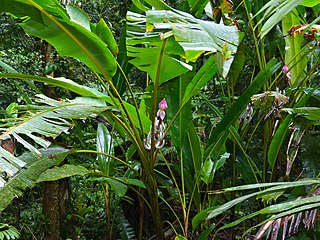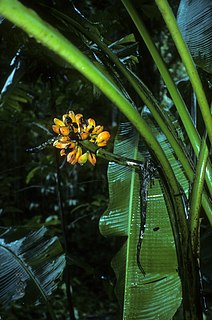
Musa is one of two or three genera in the family Musaceae. The genus includes flowering plants producing edible bananas and plantains. Around 70 species of Musa are known, with a broad variety of uses.
Musa tuberculata is a tropical Asian species of plant in the banana family native to the Malesian region (Brunei). It is one of fourteen species of Musa endemic to the island of Borneo. The specific epithet "tuberculata" is from the Latin meaning "covered with minute tubercles". M. tuberculata is placed in section Callimusa, members of which have a diploid chromosome number of 2n = 20.
Musa salaccensis, commonly called Javanese wild banana, is a Malesian tropical species of plant in the banana family native to the islands of Sumatra and Java, in Indonesia. It is placed in section Callimusa, members of which have a diploid chromosome number of 2n = 20.
Musa insularimontana is a species of plant in the banana family native to Taiwan, where it is known by the name lan yu ba jiao. It is placed in section Callimusa, having a diploid chromosome number of 2n = 20.
Musa hirta is a tropical Asian species of plant in the banana family native to Sarawak on the island of Borneo, in Malaysia. It is one of fourteen species of Musa endemic to the island of Borneo. It is placed in section Callimusa, having a diploid chromosome number of 2n = 20.

Musa coccinea, commonly known as scarlet banana or red-flowering banana, is a species of flowering plant in the banana and plantain family Musaceae, native to tropical China and Vietnam. It is a bat-pollinated evergreen perennial, placed in section Callimusa, having a diploid chromosome number of 2n = 20.

Musa bukensis is a species of wild banana from the Solomon Islands. It is placed in section Callimusa, having a diploid chromosome number of 2n = 20.
Musa jackeyi is a species of wild banana. It is placed in section Callimusa. It has only a small native range in north-east Queensland, Australia. It resembles the cultivated bananas called "fe'i" or "fehi", having an upright rather than a drooping fruit stalk, with the green terminal bud pointing upwards, and sap which is reddish in colour.
Musa azizii is a species of wild banana, native to Sarawak, Malaysia. It is placed in section Callimusa, having a diploid chromosome number of 2n = 20.
Musa barioensis is a species of wild banana, native to Sarawak, Malaysia. It is placed in section Callimusa, having a diploid chromosome number of 2n = 20.

Musa bauensis is a species of wild banana, native to Sarawak, Malaysia. It is placed in section Callimusa, having a diploid chromosome number of 2n = 20.

Musa borneensis is a species of wild banana, native to the island of Borneo, in the Malaysian states of Sabah and Sarawak. It is placed in section Callimusa, having a diploid chromosome number of 2n = 20.

Musa campestris is a species of wild banana, native to the island of Borneo, in the Malaysian states of Sabah and Sarawak. It is placed in section Callimusa, having a diploid chromosome number of 2n = 20.
Musa johnsii is a species of wild banana, native to western New Guinea. It is placed in section Callimusa, having a diploid chromosome number of 2n = 20.
Musa lawitiensis is a species of wild banana, native to the island of Borneo. It is placed in section Callimusa, having a diploid chromosome number of 2n = 20.
Musa lokok is a species of wild banana, native to Sarawak, on the island of Borneo. It is placed in section Callimusa, having a diploid chromosome number of 2n = 20.

Musa lolodensis is a species of wild banana, occurring naturally from the Moluccas through to New Guinea. It is placed in section Callimusa, having a diploid chromosome number of 2n = 20. It is one of the possible parents of the cultivated Fe'i bananas.
Musa monticola is a species of wild banana, native to Sabah on the island of Borneo. It is placed in section Callimusa, having a diploid chromosome number of 2n = 20.
Musa violascens is a species of wild banana, native to Peninsular Malaysia. It is placed in section Callimusa, members of which have a diploid chromosome number of 2n = 20.
Musa viridis is a species of wild banana, native to northern Vietnam. It is placed in section Callimusa, members of which have a diploid chromosome number of 2n = 20.






